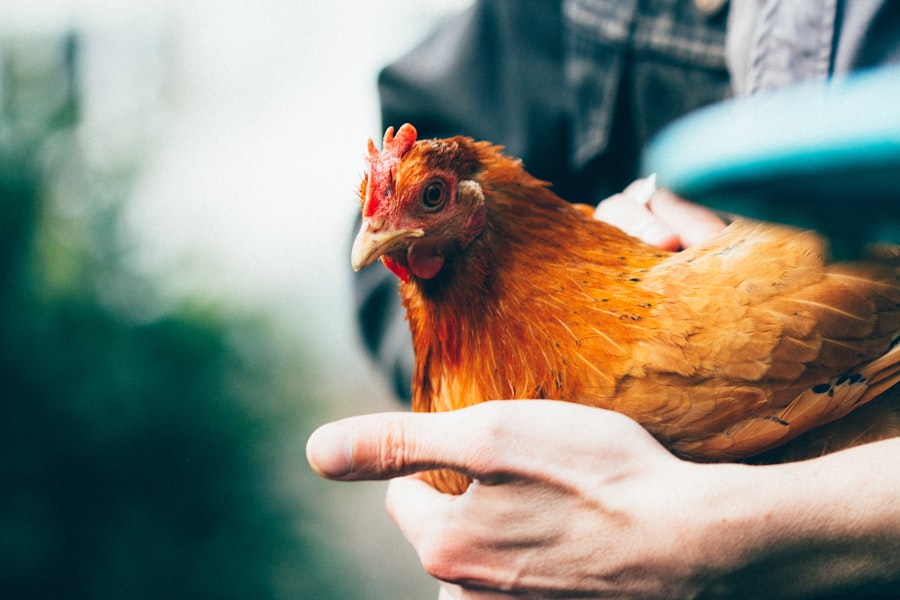Keeping chickens in the city is becoming increasingly popular as people recognize the numerous benefits that come with it. Chickens are not only great pets that provide companionship and entertainment, but they also offer a sustainable source of fresh eggs. In addition, raising chickens in an urban environment allows individuals to connect with nature and practice self-sufficiency.
One of the main advantages of keeping chickens in the city is the access to fresh eggs. Unlike store-bought eggs, which may have been sitting on shelves for weeks, homegrown eggs are incredibly fresh and nutritious. They are also free from any harmful chemicals or antibiotics that may be present in commercial eggs. By having your own chickens, you can ensure that you and your family have a constant supply of high-quality eggs.
Furthermore, chickens are great pets that provide entertainment and companionship. They have unique personalities and can be quite amusing to watch as they go about their daily activities. Chickens are also known to be social animals and can form bonds with their owners. Many people find joy in spending time with their chickens, whether it’s feeding them, watching them scratch around in the yard, or simply sitting and observing their behavior.
Key Takeaways
- Keeping chickens in the city has numerous benefits, including fresh eggs, natural pest control, and a fun hobby.
- It’s important to research and understand local regulations and ordinances before starting an urban chicken coop.
- Choosing the right breed of chicken for your city environment is crucial for their health and productivity.
- When building a chicken coop in the city, factors such as space, ventilation, and predator protection should be considered.
- Maintaining a clean and safe chicken coop in an urban environment requires regular cleaning, proper waste disposal, and pest control measures.
Understanding Local Regulations and Ordinances for Urban Chicken Keeping
Before embarking on the journey of keeping chickens in the city, it is crucial to understand and comply with local regulations and ordinances. Different cities and towns have varying rules regarding urban chicken keeping, so it is essential to check with your local government to see if they allow chickens.
Some cities may have restrictions on the number of chickens you can keep or require specific permits or licenses. Others may have guidelines on coop size, setback requirements, or noise regulations. It is important to familiarize yourself with these regulations to avoid any legal issues or conflicts with neighbors.
Choosing the Right Breed of Chicken for Your City Environment
When choosing the right breed of chicken for your city environment, there are several factors to consider. Firstly, you need to think about the size of your yard. If you have a small backyard, you may want to opt for smaller breeds that require less space to roam. On the other hand, if you have a larger yard, you can consider larger breeds that need more room to forage.
Secondly, it is important to consider the climate in your area. Some chicken breeds are better suited for colder climates, while others thrive in warmer temperatures. Research different breeds and choose one that is well-adapted to your local climate to ensure the health and well-being of your chickens.
Additionally, consider the temperament of the breed. Some breeds are known to be more docile and friendly, making them suitable for families with children or individuals who want chickens as pets. Other breeds may be more flighty or independent, which can make them better suited for individuals who are primarily interested in egg production.
Building a Chicken Coop: Factors to Consider for Urban Settings
Building a chicken coop in an urban setting requires careful consideration of various factors. Firstly, think about the size of your coop. It should be large enough to comfortably accommodate your chickens but not so big that it takes up too much space in your yard. Consider the number of chickens you plan to keep and ensure that they have enough room to move around and engage in natural behaviors.
Next, consider the location of your coop. It should be placed in an area that is well-drained and receives adequate sunlight. Avoid placing it too close to your neighbor’s property or areas where noise or odor may become an issue. Additionally, ensure that the coop is easily accessible for cleaning and maintenance purposes.
When it comes to materials and design, there are various options available. You can choose to build a coop from scratch using wood or repurpose an existing structure such as a shed or playhouse. Consider using materials that are durable, weather-resistant, and easy to clean. It is also important to ensure that the coop is secure and predator-proof to keep your chickens safe.
Chicken Coop Design and Layout: Tips and Ideas for Maximizing Space
In an urban environment where space is often limited, it is important to maximize the area in your chicken coop. One way to do this is by utilizing vertical space. Consider adding shelves or perches at different heights to provide additional roosting and resting areas for your chickens. This not only maximizes space but also encourages natural behaviors such as jumping and perching.
Another way to maximize space is by incorporating features such as nesting boxes and feeders that can be mounted on the walls or hung from the ceiling. This eliminates the need for bulky structures on the floor, allowing more room for your chickens to move around.
Additionally, consider using removable or foldable elements in your coop design. For example, you can install removable roosting bars or foldable nesting boxes that can be easily taken out or collapsed when not in use. This provides flexibility and allows you to create more space when needed.
Materials and Tools Needed for Building a Chicken Coop in the City

Before starting your chicken coop building project, it is important to gather all the necessary materials and tools. The specific materials you will need depend on the design and size of your coop, as well as your personal preferences.
Some common materials needed for building a chicken coop include wood for framing, siding, and flooring; wire mesh for windows and ventilation; roofing material such as shingles or metal sheets; and hardware such as screws, nails, hinges, and latches.
In terms of tools, you will likely need a saw for cutting wood, a drill for making holes and attaching hardware, a hammer for driving nails, and a tape measure for taking accurate measurements. Other useful tools may include a level for ensuring the coop is straight and plumb, a staple gun for attaching wire mesh, and a paintbrush or roller for applying a protective finish.
Consider using recycled materials whenever possible to save money and reduce waste. For example, you can repurpose old pallets or scrap wood for framing or use leftover paint from previous projects to add color to your coop. Not only does this help the environment, but it also adds a unique and creative touch to your coop design.
Maintaining a Clean and Safe Chicken Coop in an Urban Environment
Maintaining a clean and safe chicken coop is essential for the health and well-being of your chickens, as well as the overall success of urban chicken keeping. Regular cleaning helps prevent the spread of disease and keeps your chickens comfortable and happy.
Start by establishing a cleaning routine that includes tasks such as removing soiled bedding, cleaning and disinfecting the coop, and replacing bedding material. How often you need to clean your coop depends on various factors such as the number of chickens you have, the size of your coop, and the climate in your area. However, a general guideline is to clean the coop at least once a week.
When cleaning the coop, pay special attention to areas where droppings tend to accumulate, such as roosting bars and nesting boxes. Use a shovel or rake to remove any solid waste and then scrub these areas with a mild detergent or disinfectant. Rinse thoroughly with water and allow the coop to dry before adding fresh bedding.
In addition to regular cleaning, it is important to keep your chickens safe from predators and other hazards. Ensure that your coop is secure and predator-proof by using sturdy materials, reinforcing doors and windows, and installing locks or latches. Regularly inspect the coop for any signs of damage or weakness and make necessary repairs promptly.
Feeding and Caring for Urban Chickens: What You Need to Know
Feeding and caring for urban chickens requires providing them with a balanced diet and ensuring they have access to fresh water at all times. Chickens are omnivores and require a combination of grains, protein, fruits, vegetables, and calcium to stay healthy.
A good quality commercial chicken feed is a convenient option that provides the necessary nutrients in the right proportions. Look for feeds that are specifically formulated for laying hens if you are primarily interested in egg production. You can also supplement their diet with kitchen scraps such as vegetable peels, fruit scraps, and cooked grains. However, avoid feeding them anything that is toxic or harmful to chickens, such as chocolate, caffeine, or avocado.
In addition to food, chickens need access to fresh water at all times. Provide them with a clean water source that is easily accessible and large enough to accommodate their needs. Consider using a waterer with a nipple or cup system to prevent contamination and spillage.
It is also important to monitor your chickens’ health and be aware of common health issues that may arise. Regularly check for signs of illness or injury such as lethargy, loss of appetite, abnormal droppings, or feather loss. If you notice any concerning symptoms, consult a veterinarian who specializes in poultry health.
Dealing with Common Issues and Challenges in Urban Chicken Keeping
While keeping chickens in the city can be a rewarding experience, it is not without its challenges. Addressing common issues such as noise and odor is crucial to maintaining good relationships with your neighbors.
To minimize noise, consider choosing quieter breeds or keeping only hens since roosters are typically the main culprits when it comes to noise complaints. Additionally, provide your chickens with plenty of enrichment activities such as perches, toys, and treats to keep them occupied and reduce excessive vocalization.
Odor can be managed by regularly cleaning the coop and ensuring proper ventilation. Use absorbent bedding materials such as straw or wood shavings to help control odors. Additionally, consider using natural odor control methods such as adding herbs or essential oils to the coop or using odor-neutralizing products specifically designed for chicken coops.
Another common challenge in urban chicken keeping is dealing with pests such as mites, lice, and rodents. Regularly inspect your chickens for signs of infestation such as feather loss, irritated skin, or visible pests. Treat any infestations promptly using appropriate methods such as dusting with diatomaceous earth or using poultry-safe insecticides. Keep the coop clean and free from food spills to discourage rodents from taking up residence.
The Joys and Rewards of Raising Chickens in the City
Keeping chickens in the city can be a rewarding and enjoyable experience. Not only do they provide fresh eggs and entertainment, but they also allow individuals to connect with nature and practice self-sufficiency. With the right preparation and care, you can successfully raise chickens in an urban environment.
By understanding local regulations and ordinances, choosing the right breed of chicken, building a suitable coop, and providing proper care and maintenance, you can create a safe and comfortable home for your chickens. Remember to address common issues such as noise and odor to keep your neighbors happy and be proactive in preventing and treating health issues.
Raising chickens in the city is a wonderful way to embrace a sustainable lifestyle, teach children about responsibility and animal care, and enjoy the many benefits that come with having these feathered friends in your backyard. So why not give it a try? You may find that urban chicken keeping brings you joy, fresh eggs, and a deeper connection to nature.
If you’re considering keeping chickens in your city, you may also be interested in learning about how many eggs geese lay. Poultry Wizard has a helpful article that explores this topic in detail. Understanding the egg-laying habits of geese can provide valuable insights into the potential productivity of your backyard flock. To read more about it, check out their article on how many eggs geese lay. Additionally, if you’re wondering how big your chicken coop should be, Poultry Wizard has another informative article that provides guidance on the ideal coop size for chickens. To find out more, visit their article on how big a coop needs to be for a chicken. Lastly, if you want to ensure your chickens stay warm during colder months, Poultry Wizard offers valuable tips on how to insulate a chicken coop. Discover effective insulation techniques by reading their article on how to insulate a chicken coop.
FAQs
What are the benefits of keeping chickens in the city?
Keeping chickens in the city can provide a source of fresh eggs, natural pest control, and fertilizer for gardens. They can also be enjoyable pets and can teach children about responsibility and where their food comes from.
Are there any laws or regulations regarding keeping chickens in the city?
Yes, many cities have laws and regulations regarding keeping chickens. Some cities may require permits or limit the number of chickens allowed per household. It is important to check with your local government before keeping chickens in the city.
What kind of space do chickens need?
Chickens need a coop for shelter and a run for exercise. The coop should be large enough for the number of chickens you have and should provide protection from predators. The run should be fenced and provide at least 10 square feet per chicken.
What do chickens eat?
Chickens eat a variety of foods including chicken feed, grains, fruits, vegetables, and insects. It is important to provide a balanced diet for your chickens to ensure their health and egg production.
What are some common health issues for chickens?
Common health issues for chickens include respiratory infections, mites and lice, and egg-laying problems. It is important to monitor your chickens for any signs of illness and to provide proper care and treatment when necessary.
Can chickens be noisy?
Yes, chickens can be noisy, especially when they are laying eggs or when a predator is nearby. However, some breeds are quieter than others and proper care and attention can help minimize noise levels.
Meet Walter, the feathered-friend fanatic of Florida! Nestled in the sunshine state, Walter struts through life with his feathered companions, clucking his way to happiness. With a coop that’s fancier than a five-star hotel, he’s the Don Juan of the chicken world. When he’s not teaching his hens to do the cha-cha, you’ll find him in a heated debate with his prized rooster, Sir Clucks-a-Lot. Walter’s poultry passion is no yolk; he’s the sunny-side-up guy you never knew you needed in your flock of friends!







